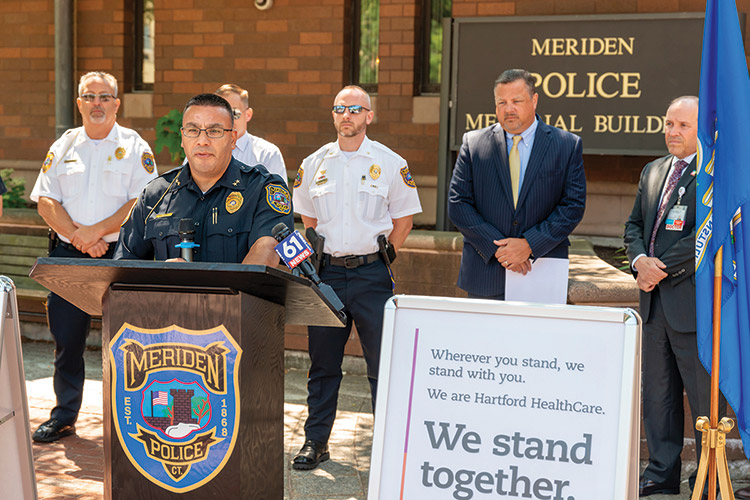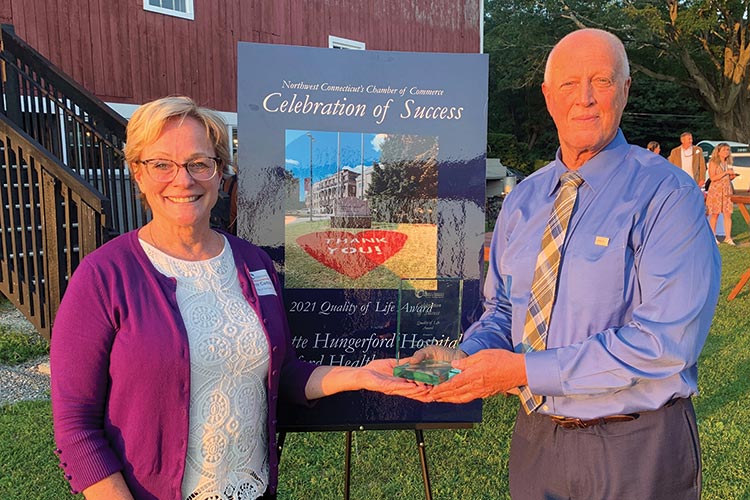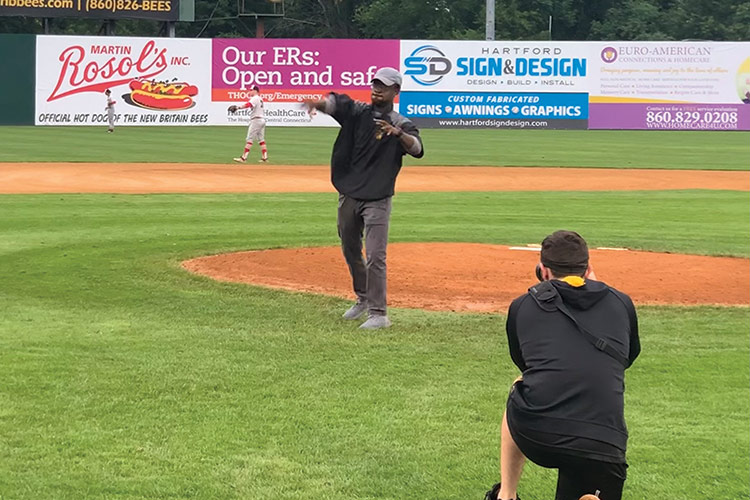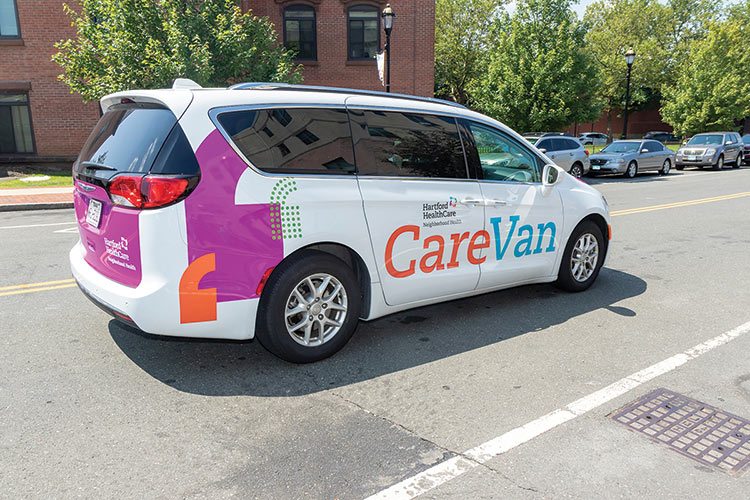Community Care
Rushford Brings MORR Opioid Resources to Meriden
Robin Stanley
With a goal of sending more people into treatment than jail, Rushford this summer strengthened its collaboration with the Meriden Police Department by embedding a clinician in the department’s Special Crimes Unit offices.
The first and only partnership of its kind in the state, the step enhances the existing Meriden Opioid Referral for Recovery (MORR) collaboration, offering crisis, addiction and mental health services to those in need.
“Our goal is to be proactive and conduct more outreach with Rushford clinicians,” said Meriden Police Chief Roberto Rosado. “This will not only help us identify individuals in crisis, but connect them with clinicians who can bring forth immediate assistance.”
The partnership began several years ago to combat the opioid crisis. The presence of a clinician at the station comes as opioid overdose deaths are at an all-time high nationwide.
“This last year has been very challenging for all of us,” said Dr. J. Craig Allen, Rushford medical director. “Beneath the pandemic has been an ongoing epidemic of substance use disorders and opioid overdoses. The stress, isolation and disruption of recovery and treatment programs have wreaked havoc on our community, especially those who suffer from substance use and mental health disorders.”
In 2020, the United States saw a 30-percent increase in drug overdose deaths, the highest ever recorded. Connecticut experienced a 14-percent increase with numbers continuing to rise. In Meriden alone, opioid overdose deaths doubled from 2019 to 2020.
Since launching in 2018, MORR, funded by a Substance Abuse and Mental Health Services Administration (SAMSHA) grant, has connected 150 people who have overdosed in Meriden with treatment, said Jessica Matyka, clinical director at Rushford.
Rushford clinicians will be on-site at the station during the week to provide crisis support, diagnosis, counseling and referral to treatment. The presence of a clinician will also allow police to offer additional victim support services.
“When a detective interviews a crime victim, they no longer have to hand over a pamphlet or card with a phone number to call to receive support,” said Det. Sgt. George Clements. “Instead, they will be able to interface directly with a clinician who will can better support, assess and get them pointed in the correct direction.”
Call Rushford’s Access Center at 877.577.3233 to be connected to clinicians and resources.

Police Chief Roberto Rosado announces the expansion of a partnership between Meriden and Hartford HealthCare to address the opioid crisis.
Photo by Chris Rakoczy
Program Builds Confidence Through Skills
Robin Stanley
It is not every day that you see a group of 12- and 13-year-olds using power tools to sand wood. But, for Chet Samok’s clients in Natchaug’s Extended Day Treatment (EDT) program, it’s just another day.
A mental health worker at Joshua Center Northeast, Samok helps offer the opportunity for school-aged children to improve social skills while receiving psychological care. The program includes clinical and educational group sessions, family therapy, outings, team-building and volunteer projects.
“Most of the kids have social anxiety,” Samok said. “EDT works on those social skills. We go out into the community a lot to practice. For example, if we go for ice cream, the kids may be too nervous to order the first time. We work on developing those social skills and try to teach life skills.”
Samok started in the maintenance department at Natchaug in 2014 on summer breaks from Eastern Connecticut State University, and knew his true calling was working with children. Selfdescribed as someone who likes working with his hands, he found a way to blend two passions at the EDT, providing hands-on experiential learning opportunities for clients.
“I enjoy working on cars, and I have my own shop at home,” he said. “I have many old motors, so I brought them in and let the kids take them apart. For most of the kids, the stuff I try to do with them, they have no option of doing at home. I try to give them something different to do, rather than play video games or watch TV.”
Chester (Chet) Samok, right, helps students in the Extended Day Treatment (EDT) program at Joshua Center Northeast in Danielson work on a remodeling project at the Quinebaug Day Treatment center.
Other activities include building and painting birdhouses, fishing and service projects for the neighboring Quinebaug Day Treatment Center.
“Kerri Griffin, the program director, liked the birdhouses and she knows that I like building things,” Samok said. “A picnic table at Quinebaug broke and she asked if we could fix it.”
In addition, Samok’s clients are working to transform offices at Quinebaug into a food pantry and clothing closet called Laura’s Pantry and Laura’s Closet in memory of Laura Lassow, a primary therapist who recently passed away.
EDT clients diligently worked on shelving and clothing racks for the closet, with Samok teaching them how to sand and paint the wood. “I took the kids to measure the spaces, and I let them be creative about what they wanted to do,” Samok said. “I didn’t have much input because I wanted them to express themselves.”
Busy sanding a piece of wood, 12-year-old Colin said he enjoys learning and doing good deeds. “It’s lots of fun,” he said. “If I didn’t come here, I never would have learned this.”
Chamber Celebrates CHH Healthcare Heroes
Tim Lebouthillier
The Northwest Chamber of Commerce named Charlotte Hungerford Hospital (CHH) a 2021 Quality of Life Award Winner at its 20th Annual Celebration of Success. The award recognizes individuals and organizations demonstrating exceptional, unselfish service to the northwest corner.
“Every day and night for the past 18 months, I witnessed the compassion, wisdom, courage and strength of our staff as they put aside their own fear and fatigue to give everything they had to our ill and injured,”
Torrington Mayor Elinor Carbone said, “I can tell you from the perspective of a municipal leader that the role Charlotte Hungerford Hospital plays in our community goes far beyond patient care, safety and clinical excellence. Our hometown hospital has repeatedly and successfully stretched its resources to ensure access to quality and integrated healthcare. They have become a community partner in every sense of the word.”
Dan McIntyre, president of the Northwest Region and senior vice president of Hartford HealthCare, accepted the award on behalf of CHH and HHC.
“Every day and night for the past 18 months, I witnessed the compassion, wisdom, courage and strength of our staff as they put aside their own fear and fatigue to give everything they had to our ill and injured,” he said. “We learned to lean on each other and reach deep, pulling ourselves into a resilient ‘can do’ mind set, and making every moment matter.”

Northwest Region President Dan McIntyre, right, accepts the 2021 Quality of Life Award from Torrington Mayor Elinor Carbone.
Trainer’s Quick Thinking Saves a Life
Ken Harrison
Khamari Haughton is used to responding to calls for help. As Hartford HealthCare Rehabilitation Network’s certified athletic trainer for New Britain High School, he’s helped countless student athletes injured during games or practices.
The call he heard while covering a baseball game at the New Britain Bees stadium last spring, however, didn’t come from the field but the stands behind him.
“I remember hearing people calling for help. I instinctively looked out on the field, but didn’t see anyone hurt,” Haughton recalled. “That’s when I realized it was coming from the seats behind me. This was definitely not a situation I had experienced before, but we do train for this so I knew what I had to do.”
Springing into action, Haughton rushed to find a spectator in cardiac arrest. He immediately began performing CPR on the man and realized he’d need to employ an AED defibrillator. Managing to keep calm despite the turmoil around him, he administered what turned out to be a lifesaving jolt of electricity. Within several minutes, first responders arrived to transport the man to the hospital where he eventually made a full recovery.
“It’s not something you expect to happen at a game,” he said. “Up until that point, the worst injury I had treated was a broken bone, but in the moment I didn’t really have time to think. It was just ‘let’s get to work.’”
As a way of thanking him for his heroic efforts, the Bees invited Haughton back to throw out the ceremonial first pitch at the Futures Collegiate Baseball League All-Star game in July. Following the pitch, Haughton was presented with the Connecticut Athletic Trainers’ Association President’s Award for outstanding contributions to the profession.
“That was very cool,” Haughton said. “My family was there, so it was great to celebrate the moment with them.”
 Khamari Haughton, ATC, with the Hartford HealthCare Rehabilitation Network, throws out the first pitch at the Futures Collegiate Baseball League All-Star game at New Britain Stadium. Photo by Ken Harrison
Khamari Haughton, ATC, with the Hartford HealthCare Rehabilitation Network, throws out the first pitch at the Futures Collegiate Baseball League All-Star game at New Britain Stadium. Photo by Ken Harrison
Fairy Tails at Beardsley Zoo
Children from across the state visited Beardsley Zoo in September, dressed as Marvel characters, firefighters, princesses and other special people for Fairy Tails. The event was sponsored by the Pediatric Care Alliance, a partnership between Hartford HealthCare and Connecticut Children’s. There were adventures and fun for all ages at the Bridgeport zoo.
Vans Narrow Gap Between Communities, Care
Susan McDonald
One year after Hartford HealthCare clinicians took COVID-19 testing to the urban Open Hearth Shelter, a sleek new white van with colorful system decals pulled up outside to launch the era of mobile healthcare there.
Open Hearth, as both leadership from the men’s shelter and HHC noted, is a perfect example of people who go without quality healthcare for a variety of reasons.
First COVID testing, then vaccine clinics and, this August, the shelter became the site for HHC to launch its Neighborhood Health Program and CareVans being deployed across the state to address the gap in healthcare access for the people who need it most.
“We couldn’t be more excited to activate our mobile health strategy,” said HHC President and CEO Jeffrey Flaks. “This is a good example of how we are already better than normal — committed to leaving no community and no person behind.”
Keith Grant, senior system director of infection prevention at HHC, said data long before the pandemic indicated a stark difference between life expectancy in Connecticut based on ZIP code. The pandemic, he explained, further highlighted this disparity.
“Normal is the space we’re comfortable in. We’re changing that to bring healthcare and bridge that gap so if we experience another pandemic, people will experience it significantly differently,” Grant said.
The Neighborhood Health Program begins with two vans making scheduled stops in underserved areas. The first targeted areas are Hartford, Torrington, Winsted and Thomaston. Flaks said he expects the program to expand with more vans and clinics in the future.
Services available through the clinics are for people age 16 and older, and include:
- Screenings for conditions such as diabetes, prostate cancer and breast health
- Mental health counseling
- Medical referrals, including to primary care providers
- Patient education, counseling and support
- Lab tests
- Pfizer and Moderna COVID-19 vaccines on select dates
The innovative health clinics will be adaptable, flexible and open to feedback to ensure access to the most necessary services and programs. Walkins and appointments for clinic stops are accepted. For more information, go to https://hartfordhealthcare. org/neighborhoodhealth

Two CareVans are making stops in the Hartford and Northwest regions, with more vans planned for other areas in the future. Photo by Chris Rakoczy
